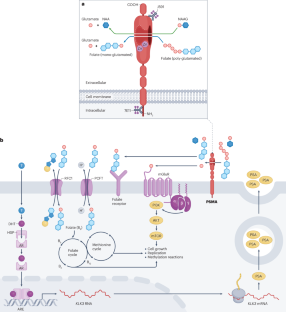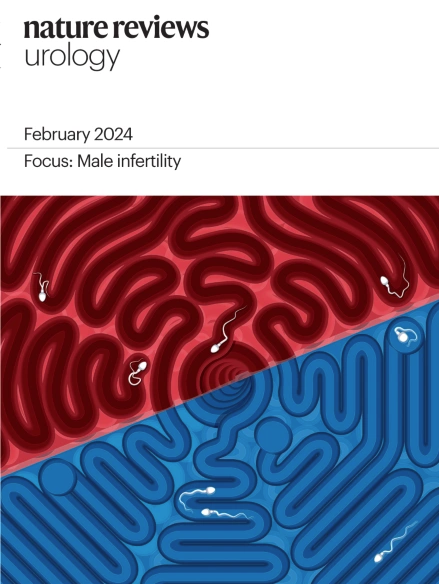前列腺癌中 PSMA 表达、调节和异质性的生物学决定因素。
IF 12.1
1区 医学
Q1 UROLOGY & NEPHROLOGY
引用次数: 0
摘要
前列腺特异性膜抗原(PSMA)是前列腺癌的重要细胞表面成像生物标志物和治疗靶点。PSMA 靶向治疗药物 177Lu-PSMA-617 于 2022 年获批用于 PSMA-PET 阳性的转移性去势抵抗性前列腺癌患者。然而,并非所有患者都对 PSMA-放射配体疗法有反应,部分原因是 PSMA 在肿瘤中的表达具有异质性。PSMA调控网络由PSMA转录复合物、环向FOLH1(PSMA)基因启动子的上游增强子、基因间增强子和不同甲基化区域组成。我们对 PSMA 调控网络和 PSMA 抑制机制的认识正在不断发展。在临床上,分子成像为了解 PSMA 在治疗过程中和疾病进展过程中的动态变化提供了一个独特的窗口,但由于 PET 的分辨率有限,这也带来了挑战。PSMA 的调节和异质性--包括肿瘤间和患者间的异质性、时间变化、系动态和肿瘤微环境--影响 PSMA 治疗学。PSMA 对放射性配体疗法的反应和耐药性由多种潜在机制介导,目前正在开发 PSMA 之外的补充生物标记物。了解细胞表面靶点调控和异质性的生物学决定因素,可为 PSMA 治疗技术及其他新兴疗法的精准医学方法提供依据。本文章由计算机程序翻译,如有差异,请以英文原文为准。


Biological determinants of PSMA expression, regulation and heterogeneity in prostate cancer
Prostate-specific membrane antigen (PSMA) is an important cell-surface imaging biomarker and therapeutic target in prostate cancer. The PSMA-targeted theranostic 177Lu-PSMA-617 was approved in 2022 for men with PSMA-PET-positive metastatic castration-resistant prostate cancer. However, not all patients respond to PSMA-radioligand therapy, in part owing to the heterogeneity of PSMA expression in the tumour. The PSMA regulatory network is composed of a PSMA transcription complex, an upstream enhancer that loops to the FOLH1 (PSMA) gene promoter, intergenic enhancers and differentially methylated regions. Our understanding of the PSMA regulatory network and the mechanisms underlying PSMA suppression is evolving. Clinically, molecular imaging provides a unique window into PSMA dynamics that occur on therapy and with disease progression, although challenges arise owing to the limited resolution of PET. PSMA regulation and heterogeneity — including intertumoural and inter-patient heterogeneity, temporal changes, lineage dynamics and the tumour microenvironment — affect PSMA theranostics. PSMA response and resistance to radioligand therapy are mediated by a number of potential mechanisms, and complementary biomarkers beyond PSMA are under development. Understanding the biological determinants of cell surface target regulation and heterogeneity can inform precision medicine approaches to PSMA theranostics as well as other emerging therapies. This review explores the basic biology of prostate-specific membrane antigen (PSMA) and its growing significance in molecular imaging and treatment. It emphasizes the importance of understanding PSMA regulation and heterogeneity for the effective application of PSMA-targeted radioligand therapy.
求助全文
通过发布文献求助,成功后即可免费获取论文全文。
去求助
来源期刊

Nature Reviews Urology
医学-泌尿学与肾脏学
CiteScore
12.50
自引率
2.60%
发文量
123
审稿时长
6-12 weeks
期刊介绍:
Nature Reviews Urology is part of the Nature Reviews portfolio of journals.Nature Reviews' basic, translational and clinical content is written by internationally renowned basic and clinical academics and researchers. This journal targeted readers in the biological and medical sciences, from the postgraduate level upwards, aiming to be accessible to professionals in any biological or medical discipline.
The journal features authoritative In-depth Reviews providing up-to-date information on topics within a field's history and development. Perspectives, News & Views articles, and the Research Highlights section offer topical discussions and opinions, filtering primary research from various medical journals.
Covering a wide range of subjects, including andrology, urologic oncology, and imaging, Nature Reviews provides valuable insights for practitioners, researchers, and academics within urology and related fields.
 求助内容:
求助内容: 应助结果提醒方式:
应助结果提醒方式:


